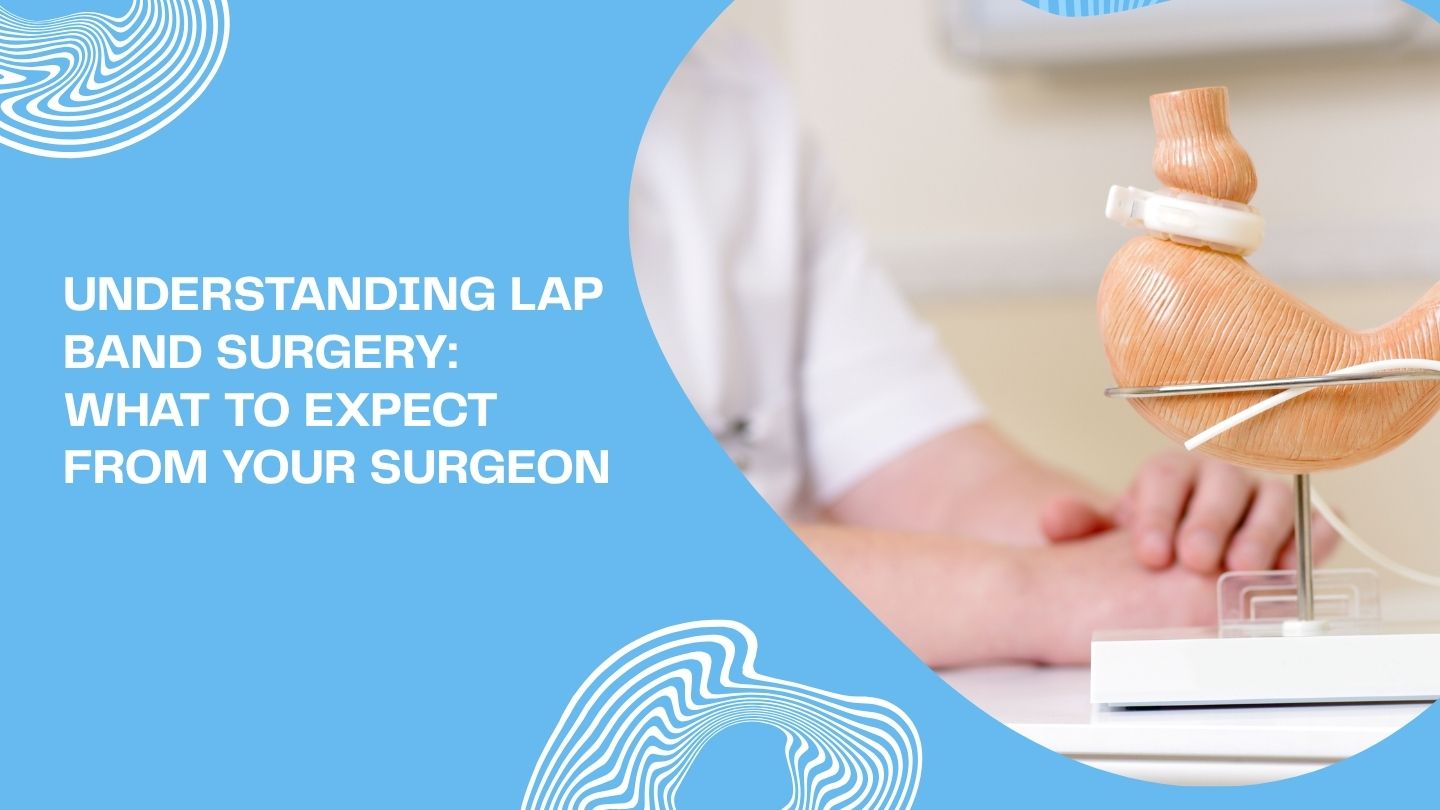
Understanding Lap Band Surgery: What to Expect from Your Surgeon
Understanding lap band surgery: what to expect from your surgeon is vital for anyone considering this weight loss option. This blog covers everything from the initial consultation to post-surgical care. Learn about the assessments, the surgery itself, and potential risks and benefits. Prepare yourself with clear expectations and make informed decisions.
Key Takeaways
- The initial consultation is crucial for evaluating medical history, discussing surgical options, and establishing a supportive care team to prepare for lap band surgery.
- Pre-operative assessments, including medical evaluations and nutritional counseling, are essential for ensuring optimal health before the procedure.
- Post-operative care and long-term lifestyle changes are vital for successful recovery and sustained weight loss after lap band surgery.
Initial Consultation with Your Surgeon
The initial consultation with your weight loss surgeons is a critical first step in your weight loss journey. During this meeting:
- Your surgeon will evaluate your medical history.
- Various weight loss surgery options available, including lap band surgery and weight loss surgeries, as well as weight loss procedures, will be discussed.
- You’ll undergo psychological evaluations to ensure you are mentally prepared and free from disorders that could hinder your recovery.
An interprofessional team, which may include dietitians, psychologists, and surgeons, collaborates to provide an effective preoperative assessment. This team approach ensures that every aspect of your health is considered, setting you up for the best possible outcome. Asking questions about the surgery process and potential outcomes during your first meeting helps establish a mutual understanding between you and your surgeon regarding expectations and goals.
By the end of this consultation, you should feel confident in the plan laid out for you. Having a team of experts supporting you can make all the difference in preparing for what lies ahead. Additionally, understanding the key differences between lap band and gastric sleeve surgery can help you make an informed decision about the procedure that best suits your needs.
Pre-Operative Assessments
The pre-operative assessment is designed to ensure you are in the best possible health before undergoing lap band surgery. This involves a complete medical evaluation that reviews your health history and physical condition. It’s crucial that you disclose any existing medical conditions that might affect surgery or recovery.
You will likely undergo several tests, including blood tests and imaging tests, such as chest X-rays and abdominal ultrasounds. These tests help assess your cardiovascular health, screen for anemia and vitamin deficiencies, and check for potential liver issues and gallstones.
Consulting with a dietitian or nutritionist as part of your weight loss preparation process is often recommended. Nutritional counseling helps prepare you for dietary changes post-surgery and establishes a weight loss plan tailored to your needs. These steps ensure that you are well-prepared for the surgical procedure ahead.
Understanding the Lap Band Procedure

Lap band surgery is a minimally invasive weight loss solution designed for individuals struggling with obesity. The procedure involves placing an adjustable gastric band around the upper portion of the stomach, creating a smaller stomach pouch and a small upper pouch to limit food intake, which can be likened to a narrow opening. Bariatric surgery is an option that some may consider alongside gastric banding.
Using laparoscopic methods, the surgery is performed through several small incisions rather than one large one, typically lasting between 30 and 60 minutes under general anesthesia. This minimally invasive surgery approach reduces recovery time and minimizes scarring, making it a preferred choice among various surgical procedures, especially when compared to major surgery.
The adjustable gastric band is connected to a port beneath the skin, allowing for adjustments by adding or removing saline. This feature enables your surgeon to manage your weight loss goals effectively over time. Understanding these details helps demystify the procedure and prepares you for what to expect.
Preparing for Surgery Day
Preparing for surgery day involves several practical steps to ensure everything goes smoothly. It is essential to bring someone to the hospital who can stay with you and drive you home after the procedure. Wearing loose-fitting clothing on the day of surgery can also help with comfort.
The total duration of the surgery typically lasts between two and three hours, although the actual operation is under an hour. Being aware of these details can help alleviate some of the anxiety associated with the procedure, allowing you to focus on your recovery.
Post-Operative Care and Recovery
Post-surgery care is crucial for a successful recovery. Key points include:
- Patients usually experience a dull ache around the incision sites, which can be managed with standard pain relief.
- Monitoring for signs of infection or complications is essential during the recovery phase.
- Keeping the incision site clean and dry is vital for proper healing.
Post-surgery care recommendations include:
- Patients are generally placed on a liquid diet for the initial weeks to allow healing.
- Maintain a diet rich in protein.
- Stay hydrated by consuming at least 64 ounces of fluids daily.
- Attend follow-up visits for adjustments to the gastric band, particularly during the first year.
Patients are advised to take vitamin and mineral supplements for life to prevent deficiencies and avoid complications. Adhering to these post-operative care instructions can significantly impact the success of the surgery and your overall health.
Long-Term Lifestyle Changes

Long-term lifestyle changes are critical for maintaining weight loss after lap band surgery. Essential steps include:
- Addressing dietary habits
- Incorporating regular exercise into your routine
- Starting with walking soon after surgery
- Gradually increasing activity levels to help in long-term weight maintenance.
Ongoing support from healthcare providers is necessary to help manage weight and prevent recidivism. After gastric band surgery, patients typically lose around 40% of their excess weight. This gradual weight loss generally occurs within a two-year period and is significant when patients carry enough weight. Understanding how gastric band surgery works can further enhance patient outcomes.
Embracing these lifestyle habit changes can lead to significant improvements in your health and quality of life.
Revision Surgery Options
Revision surgery may be necessary if you experience weight regain or complications from the original lap band procedure. If the desired outcomes are not achieved, you may be evaluated for medical weight loss options or additional surgery.
Types of revision surgeries include converting the gastric band to a sleeve gastrectomy or gastric bypass surgery. These surgeries are often more complex due to existing scar tissue. However, the lap band can be easily removed if necessary, unlike some other bariatric procedures.
Patients typically achieve an average weight loss of up to 35% of their excess weight after a revision, which raises the question of how much weight most patients can expect to lose compared to 75% after the initial surgery. Understanding these options can help you make an informed decision if revision surgery becomes necessary, especially in cases of inadequate weight loss and significant weight loss.
Wrapping Up
Lap band surgery is a viable weight loss solution with unique advantages and challenges. From the initial consultation to long-term lifestyle changes, understanding each step of the process can prepare you for a successful journey.
If you’re considering lap band surgery, it’s crucial to consult with an experienced lap band Surgeon in East Cobb, Marietta, Smyrna, and Austell who can guide you through each stage. At Wellstar Comprehensive Bariatric Services, we are committed to helping individuals achieve long-term weight loss and improve their quality of life. Whether you’re looking for initial surgery or revision options, our team is here to support you every step of the way.
Frequently Asked Questions
What is lap band surgery, and how does it work?
Lap band surgery is a minimally invasive weight loss procedure where an adjustable gastric band is placed around the upper stomach to create a smaller pouch. This limits food intake and helps with weight loss over time.
How long is the recovery time after lap band surgery?
Most patients experience initial recovery within 1-2 weeks. Full recovery, including adjusting to dietary changes and lifestyle habits, may take several weeks to months.
What kind of diet should I follow after lap band surgery?
Post-surgery, patients typically start with a liquid diet, gradually transitioning to soft foods and then solid foods. A high-protein, low-carb diet is recommended, along with lifelong vitamin and mineral supplementation.
Can the lap band be adjusted or removed?
Yes, the gastric band is adjustable through a port under the skin to help manage weight loss goals. If necessary, the band can be removed or revised during additional surgery.
